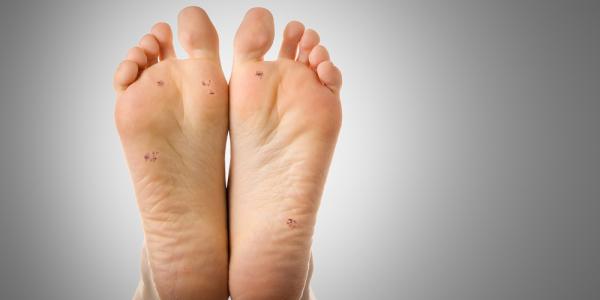
Treatment of Warts and Verrucas
Warts are small protrusions or raised lumps, which are caused by a viral infection often arising as a result of broken skin or a compromised immune system. There are several methods for the treatment of warts and these include the use of salicylic acid, freezing of warts known as cryotherapy, and other chemical treatments for warts.
The virus normally associated with the occurrence of warts is the Human Papilloma Virus (HPV). It is estimated that the majority of the population has been exposed to this virus at some point in their lives. There are over 100 types of HPV viruses and usually each one is responsible for the formation of a specific wart in different parts of the body.
There are many different types of warts varying in shape and site of infection ranging from the common wart, verruca vulgaris, to genital warts. Warts can be highly contagious and hence one should not use towels and objects from people who already have warts. You can also spread warts to yourself from other parts of the body. Because warts are viral infections, I normally tend to recommend the use of L-Lysine by Lamberts for the treatment of warts. Take one tablet of lysine three times a day on an empty stomach. Lysine is an amino acid which helps offers multiple benefits to the body including strengthening the lining of the tissues within arteries and thus acts as a cardiovascular protectant. Additionally, it aids in the removal of lead and other environmental pollutants from the body. With specific reference to warts, Lysine inhibits viral replication by blocking the uptake of arginine, a major “food source” for the virus to multiply. In this way, the wart gradually begins to diminish in size until eventually it disappears.
Topical and at home remedies are very common practice for the treatment of warts. I would recommend the use of Organic Lemon Myrtle Oil. Lemon Myrtle, Backousia citriodora, is a plant that is native to parts of Australia. Its leaves have a very pleasant aroma from the oil within them which is why it is often used in perfumes. Researchers have found the lemon myrtle oil also displays potent antimicrobial and antiviral activity; in fact it displays almost 30% greater activity than tea tree oil and is often recommended for molluscum, a viral infection, suggesting its benefits to treat warts.
Dilute one drop of Organic Lemon Myrtle Oil with any carrier oil and apply to the area twice a day making sure you cover the wart with some tape. Lemon Myrtle Oil is especially effective for resilient warts and for recurring warts where other treatments have not been successful such as freezing or the use of less effective topical products.
Another option for the treatment of warts is to freeze them. Freezing warts, also known as cryotherapy, is normally carried out by doctors and involves applying a very cold substance which causes the warts to freeze off. Forwarts Wart Remover Precision Freeze Spray is an at-home medical device which sprays a precise jet of cooling gas to freeze the wart right to its core.
DISCLAIMER: The views, opinions and information expressed in this article and on Victoriahealth.com Ltd are those of the author(s) in an editorial context. Victoriahealth.com Ltd cannot be held responsible for any errors or for any consequences arising from the use of the information contained in this editorial or anywhere else on the site. Every effort is made by the editorial and content team to see that no inaccurate or misleading information, opinion or statement appear, nor replace or constitute endorsement from medical bodies or trials unless specified. Victoriahealth.com Ltd accept no liability for the consequences of any inaccurate or misleading data, information, opinion or statement. Information on Victoriahealth.com Ltd and in the editorials is provided for informational purposes only and is not intended as a substitute for the advice provided by your physician or other healthcare professional. You should not use the information on this website or in the editorials for diagnosing or treating a health concern or disease, or for the replacement of prescription medication or other treatment.